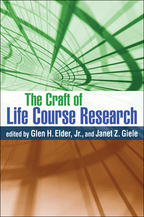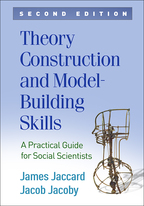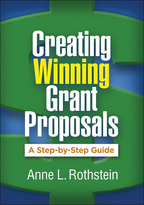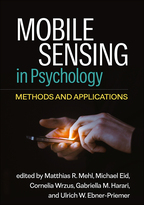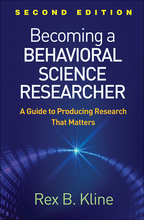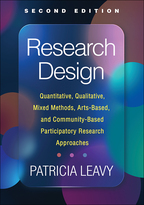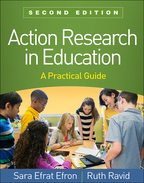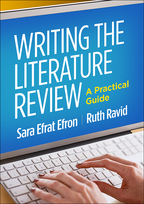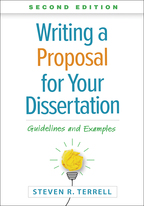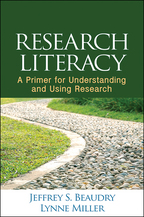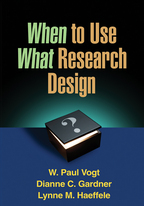The Craft of Life Course Research
Edited by Glen H. Elder and Janet Z. Giele
Paperbacke-bookprint + e-book
Paperback
orderAugust 4, 2009
ISBN 9781606233207
Price: $60.00372 Pages
Size: 6" x 9"
“The chapters, written by experts in the field, offer useful insights and historical background….Regardless of the field of study and/or level of research expertise, this textbook is a helpful reference guide for life course researchers. The textbook has an overall good structure, proceeding from an introduction to foundation concepts to more advanced research and methodological issues. The tables present information in a clear and concise manner….The writing style, ease of reading, and overall accuracy and completeness of the text is quite impressive….Highly relevant and important to many areas of research across many disciplines, including gerontology. Only through effective and on-going life course investigations can we as a society hope to better understand, predict, and promote better quality of life for today’s and tomorrow’s generations!”

—Activities, Adaptation, and Aging
“A tour de force. The chapters, written by preeminent scholars in an engaging manner, provide a blueprint for studying how lives unfold over time. The contributors illustrate the challenges that they have faced and overcome in their own research as well as showcasing dozens of studies by others. Some of the topics include how to reconstruct lives from a data set, how to study linked lives (children and parents or couples), how to study trajectories and turning points, and how to use behavioral genetics as a window into the life course. I recommend this volume to those who want to learn more about this topic and to experience the best of the field.”

—Jeanne Brooks-Gunn, PhD, Virginia and Leonard Marx Professor of Child Development, Teachers College and the College of Physicians and Surgeons, Columbia University
“This book illuminates the utility of diverse methodologies, from behavioral genetic analysis to cross-national and historical comparison. It is unique in its scope, including qualitative (life story, ethnography, diary) and quantitative (hierarchical growth, latent class, and group-based trajectory models) approaches. Students will learn how to formulate research questions, locate data sources, and increase the potential of existing data through recasting and supplementation. Ideal for methods courses and substantive courses on aging in social context.”

—Jeylan T. Mortimer, PhD, Life Course Center, Department of Sociology, University of Minnesota
“Glen Elder—whose name is synonymous with the founding of life course research—has joined forces with equally distinguished scholar Janet Giele to produce this excellent volume. Expert contributing authors present novel methodological strategies for life course studies, as exemplified through major longitudinal investigations. The knowledge and insights gained about these methods and how to apply them will be invaluable to students of the life course at all levels. This is a most important book in which the quality of the contributors and editors shines through the pages; a major contribution to the life course literature.”

—John M. Bynner, PhD, Emeritus Professor and former Director, Centre for Longitudinal Studies, Institute of Education, University of London, United Kingdom
“Elder and Giele’s book is a pleasure to read. For experienced life course scholars and those new to the field, the book provides a clear overview of important conceptual tools in the exploration of human development. The chapters offer an inside view of many classic studies and highlight unique features of each of them.”

—Toni C. Antonucci, PhD, Research Professor and Program Director, Life Course Development Program, Institute for Social Research, University of Michigan
“This is an engaging and accessible volume prepared by an impressive group of life course scholars. The chapters offer instructive information about central concepts and measures, such as trajectories and transition points, and are illustrated with diverse research approaches and findings based on both new and classic data sets. As a supplemental text in introductory graduate courses in the social sciences or public health, this book will help provide newcomers to the field with a well-rounded introduction to life course analysis.”

—Carolyn Tucker Halpern, PhD, Department of Maternal and Child Health, Gillings School of Global Public Health, University of North Carolina at Chapel Hill
—Activities, Adaptation, and Aging
“A tour de force. The chapters, written by preeminent scholars in an engaging manner, provide a blueprint for studying how lives unfold over time. The contributors illustrate the challenges that they have faced and overcome in their own research as well as showcasing dozens of studies by others. Some of the topics include how to reconstruct lives from a data set, how to study linked lives (children and parents or couples), how to study trajectories and turning points, and how to use behavioral genetics as a window into the life course. I recommend this volume to those who want to learn more about this topic and to experience the best of the field.”
—Jeanne Brooks-Gunn, PhD, Virginia and Leonard Marx Professor of Child Development, Teachers College and the College of Physicians and Surgeons, Columbia University
“This book illuminates the utility of diverse methodologies, from behavioral genetic analysis to cross-national and historical comparison. It is unique in its scope, including qualitative (life story, ethnography, diary) and quantitative (hierarchical growth, latent class, and group-based trajectory models) approaches. Students will learn how to formulate research questions, locate data sources, and increase the potential of existing data through recasting and supplementation. Ideal for methods courses and substantive courses on aging in social context.”
—Jeylan T. Mortimer, PhD, Life Course Center, Department of Sociology, University of Minnesota
“Glen Elder—whose name is synonymous with the founding of life course research—has joined forces with equally distinguished scholar Janet Giele to produce this excellent volume. Expert contributing authors present novel methodological strategies for life course studies, as exemplified through major longitudinal investigations. The knowledge and insights gained about these methods and how to apply them will be invaluable to students of the life course at all levels. This is a most important book in which the quality of the contributors and editors shines through the pages; a major contribution to the life course literature.”
—John M. Bynner, PhD, Emeritus Professor and former Director, Centre for Longitudinal Studies, Institute of Education, University of London, United Kingdom
“Elder and Giele’s book is a pleasure to read. For experienced life course scholars and those new to the field, the book provides a clear overview of important conceptual tools in the exploration of human development. The chapters offer an inside view of many classic studies and highlight unique features of each of them.”
—Toni C. Antonucci, PhD, Research Professor and Program Director, Life Course Development Program, Institute for Social Research, University of Michigan
“This is an engaging and accessible volume prepared by an impressive group of life course scholars. The chapters offer instructive information about central concepts and measures, such as trajectories and transition points, and are illustrated with diverse research approaches and findings based on both new and classic data sets. As a supplemental text in introductory graduate courses in the social sciences or public health, this book will help provide newcomers to the field with a well-rounded introduction to life course analysis.”
—Carolyn Tucker Halpern, PhD, Department of Maternal and Child Health, Gillings School of Global Public Health, University of North Carolina at Chapel Hill

